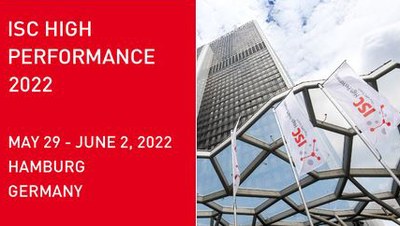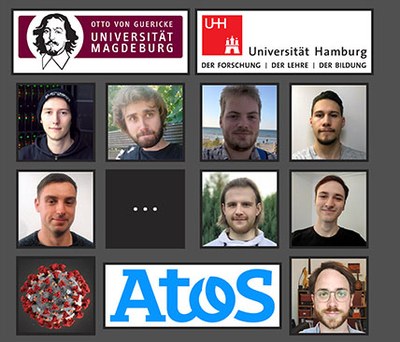19.05.2022
 The conference program covers the topics of system architectures, HPC algorithms and applications, parallel programming models and performance modeling, machine learning, and quantum computing. Parallel to the conference, more than 120 exhibitors will present themselves in the exhibition (floorplan). The DKRZ booth H801 is part of the German HPC Village, where the centers of the Gauss Alliance, the NHR Association and other national HPC stakeholders present themselves for the first time in neighbouring booths.
The conference program covers the topics of system architectures, HPC algorithms and applications, parallel programming models and performance modeling, machine learning, and quantum computing. Parallel to the conference, more than 120 exhibitors will present themselves in the exhibition (floorplan). The DKRZ booth H801 is part of the German HPC Village, where the centers of the Gauss Alliance, the NHR Association and other national HPC stakeholders present themselves for the first time in neighbouring booths.
For those unable to travel, the conference and exhibition will offer a selection of online programs. For example a virtual DKRZ booth.
At its booth H801, DKRZ will provide information about its new supercomputer "Levante", which is based on BullSequana XH2000 technology from Atos and whose 2,832 CPU nodes deliver a computing power of 14 PetaFlop/s, enabling simulations with even higher-resolution global Earth system models. Interested visitors will have the opportunity to visit the new HPC system "Levante" after a 20 min walk at DKRZ on May 31 and June 1 at 13:30.
On its climate globe and an interactive touch table, DKRZ shows current, high-resolution global climate visualizations. These are results of climate model runs computed as the German contribution to the 6th IPCC Assessement Report or as part of the Centre of Excellence ESiWACE.
 There are 17 international teams participating in this year's Student Cluster Competition (SCC). Twelve international teams have completed the competition online on the servers of the Pittsburgh Supercomputing Center and SciNet at the University of Toronto. Five European teams will compete in the exhibition hall in Hamburg, including the joint Team Elbe from the University of Hamburg and Otto von Guericke University Magdeburg, which is supervised by the Scientific Computing group at DKRZ and supported by Atos as the main sponsor.
There are 17 international teams participating in this year's Student Cluster Competition (SCC). Twelve international teams have completed the competition online on the servers of the Pittsburgh Supercomputing Center and SciNet at the University of Toronto. Five European teams will compete in the exhibition hall in Hamburg, including the joint Team Elbe from the University of Hamburg and Otto von Guericke University Magdeburg, which is supervised by the Scientific Computing group at DKRZ and supported by Atos as the main sponsor.
DKRZ has compiled tasks for the Student Cluster Competition (SCC) using the ICON application and is represented on its jury committee.
- SCC on Twitter: #ISC22_SCC
- Twitter channel of the Elbe team at SCC: https://twitter.com/scc_team_elbe
- Article "GCS Sponsors Two German Teams in the 2022 Student Cluster Competition at ISC22": https://www.gauss-centre.eu/news/newsflashes/article/gcs-sponsors-two-german-teams-in-the-2022-student-cluster-competition-at-isc22/
As part of the activities at the Gauss Alliance booth H805, on May 30, 2022 from 15:30-15:40 Dr. Panagiotis Adamidis will talk about the efforts to adapt the climate model ICON to exascale computers. Considering that such HPC Systems will be massively parallel supercomputers equipped with heterogeneous processors (CPU/GPU), a major transformation of the ICON software towards a scalable, modularized and flexible code is needed.
With an e-poster, Dr. Tobias Weigel will present the potential of Artificial Intelligence and Machine Learning methods in the field of climate and earth system research. He will highlight a few of the projects that the Helmholtz AI consultant team has been engaged in over the past two years, focusing on applications that bring ML closer to Earth System Models, and on challenges in analyzing Earth observation data.
